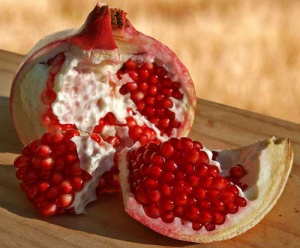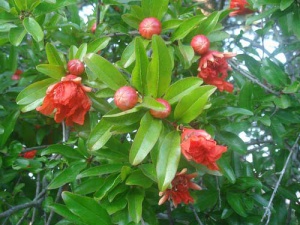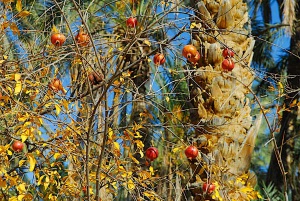Pomegranate
Contents
Habitat & Description
Pomegranate trees are native to the Middle East and Asia, but can now be found growing in many other areas of the world including India, Africa and the United States. These trees thrive in hot climates. Other names for this fruit are Chinese apple and granada.
A pomegranate is reddish pink in color and about the size of a large orange. It has a leathery skin which protects a white membrane, attached are small seed sacs (arils) which are surrounded by red pulp. The flavor is sweetly tart, which is a perfect flavor for juices, jellies, wines, teas, etc.
Preparation
Here are six easy steps needed to begin to enjoy the Pomegranate fruit.
- Cut - With a sharp paring knife, cut off the top about a half inch below the crown
- Score - Once the top is off, you'll see four to six sections. With your knife point, score the skin at each section
- Open - Separate the Pomegranate at each score, so that you have individual sections
- Loosen - Over a bowl of water, use your fingers to loosen the arils and drop them into the bowl, they will sink to the bottom
- Scoop - Use a spoon to scoop out the pieces of white membrane that have floated to the top
- Strain - Pour the remaining liquid through a strainer, place the arils in your favorite dish and enjoy
Pomegranate arils may be eaten alone, or added to many other dishes including salads, yogurt, oatmeal, appetizers, entrees and desserts.
Health Benefits
Pomegranates are popularly known as a nutritional powerhouse or "superfood". They are not only delicious, but they are a veritable treasure trove of health benefits.
Pomegranates contain polyphenols, one of nature's most powerful and effective antioxidants. Antioxidants help protect your body against "free-radicals", major factors in aging as well as chronic conditions like heart disease and cancer. Phenylpropanoids, hydrobenzoic acid, flavones and conjugated fatty acids found in Pomegranates, have been recently credited with the ability to retard the migration of cancerous cells.
They are also chock-full of vitamin C, a vital nutrient that's been shown to reduce both the length and severity of colds and flu. In addition, they contain fiber, vitamin K, vitamin A and iron. Pomegranates contain three times the antioxidants of red wine and green tea, the most of any natural food. They are effective in the prevention and treatment of the following diseases and conditions:
- arthritis (inflammation)
- diarrhea
- Alzheimer's disease
- arterial plaque
- high cholesterol and blood pressure
- dental plaque (gingivitis, periodontitis)
- prostate health (cancer, PSA stabilization)
- staphyloccus growth (bacterial)
- oxidative damage
- MRSA and skin health (lotion form)
- influenza (anti-viral)
- lung and breast cancer
Interactions & Side-Effects
Pomegranate should not be taken along with any prescription medications that are broken down or changed by the liver such as elavil, codein, prozac, zofran, etc. High blood pressure medication (ACE inhibitors) such as crestor, also interact with Pomegranate, as this fruit is known to decrease blood pressure. For this reason, it should also not be taken for at lease two weeks before any surgical operations.
It is generally safe for most people, but some with allergic reaction may experience itching, swelling or difficulty breathing. Women who are pregnant should always consult with their physician in regard to using Pomegranate. The roots themselves contain poison and must never be ingested.
Related Discussion
- Pomegranate vs. Prostate Cancer
- Pomegranates May Fight Breast Cancer
- Pomegranate juice as good as Viagra
- Pomegranate for weight-loss?
- 2008 Pomegranate Monograph
- Pomegranate Lotion Offers Hope in War on Superbugs


